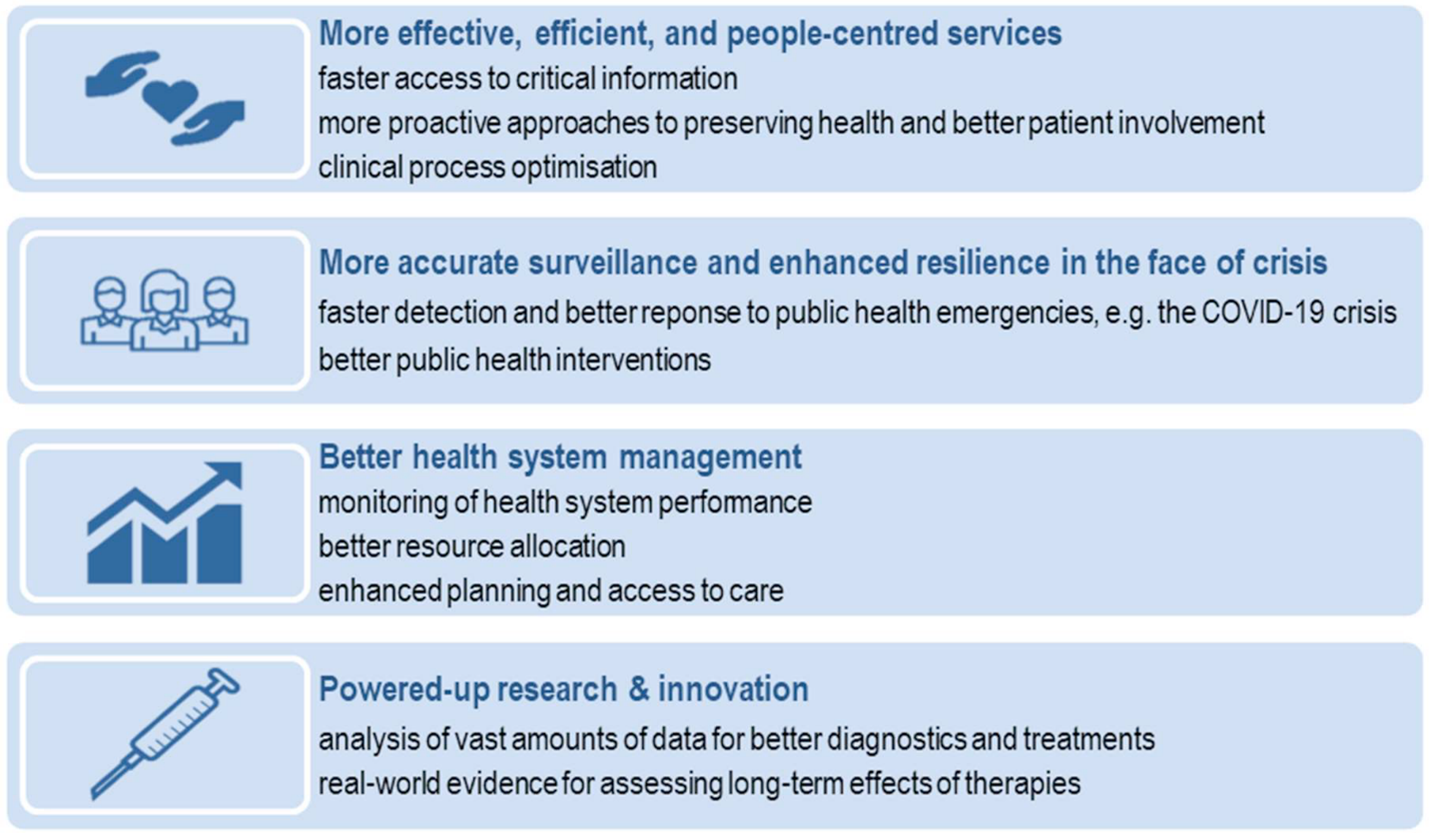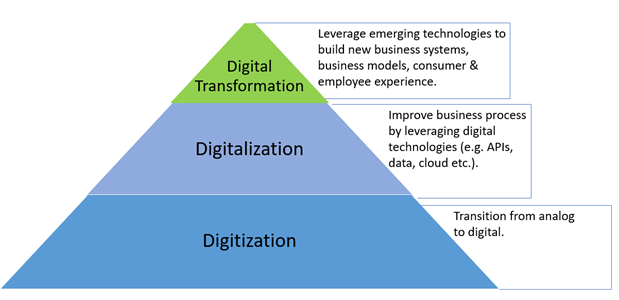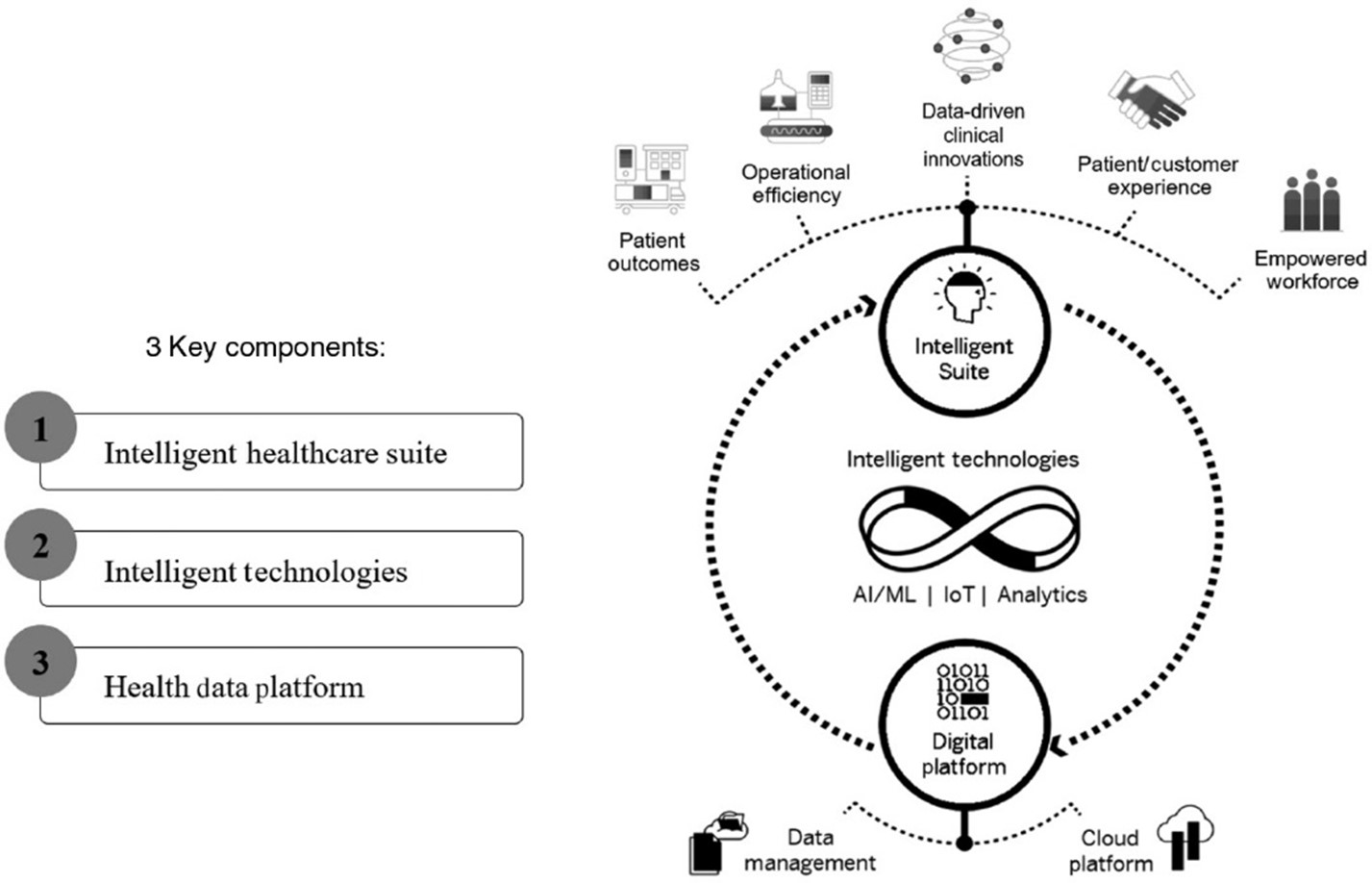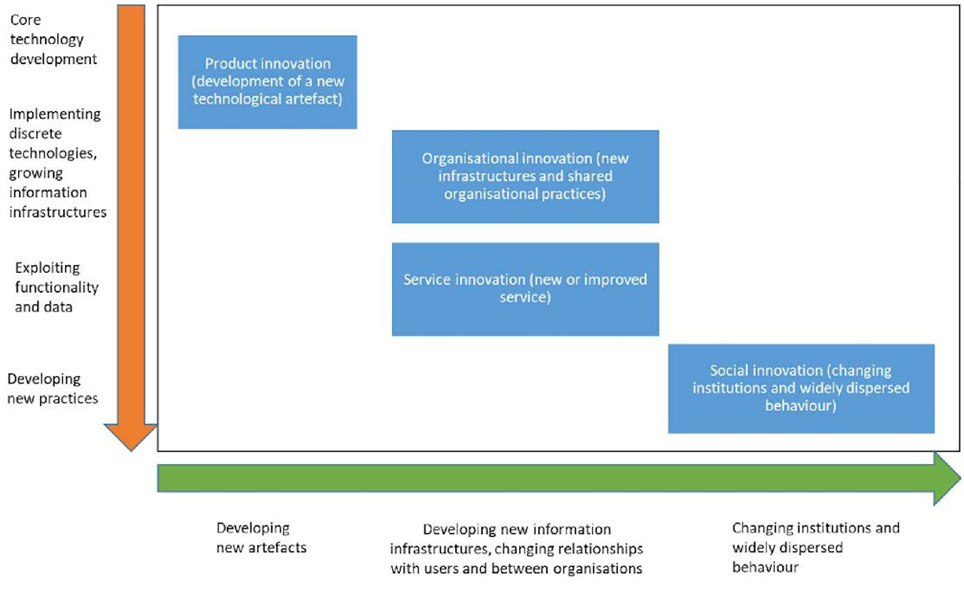1. Introduction
Introduction
Digital transformation is the integration of digital technologies into all parts of a business, radically changing how to operate and offer value to consumers. The digital transformation in the health sector can offer a wide range of benefits, summarised in Figure 1. This transformation needs to incorporate software, hardware, and services.

This transformation process starts with data digitisation and follows with system digitalisation (Figure 2).
- Digitisation is the process of converting information from analogue to digital.
- Digitalisation is the use of digital technologies to change a business model and provide new revenue and value-producing opportunities [2].

In the past 50 years, information technology has transformed many aspects of our life through automation. Improved efficiency and productivity using information technology resulted in new customer businesses (Figure 3).
![Figure 11: Evolution of Information Technologies from the digital era into the intelligence era [4].](https://learning.eupati.eu/pluginfile.php/2455/mod_page/content/8/Figure12.jpg)
Healthcare system maturity for digital transformation has four levels:
- Stage 0: The organisation is not digital. A paper-based medical record system or an analogue healthcare imaging platform are examples of stage 0 healthcare organisations.
- Stage I: Organisation with digitised data is in this stage. Such for example a hospital with a functioning EMR system. There are advantages for organisations to use digitised data, such as simple data analytics, paperless administration, etc.
- Stage II: Organisation can utilise the next-level technology tools such as AI and ML to become intelligent (Figure 4). Many digital transformation benefits (Figure 9) (e.g., virtual nursing assistants, precision medicine) will only be achieved when an organisation becomes intelligent.
- Stage III: Healthcare system or organisation offering value-based healthcare is at this level. The value-based healthcare is a model where providers will be paid based on the patients’ outcomes rather than based on completion of tasks, such as patients' consultation [4].

These levels also show the steps that healthcare organisations need to take for a meaningful digital transformation. A successful digital transformation goes beyond integrating digital technologies in the healthcare setting (Figure 5). Digital transformation is a complex process that needs a wide range of innovative solutions, including technological (i.e., novel digital solutions), organisational (e.g., service, functions), and social (e.g., cultural/behavioural changes) to enable transformation [5].

Creating an environment that supports and nurtures this transformation requires governmental and social interventions, including:
1. Build trust in the benefits of digital transformation for the users.
a. Governments need to provide leadership by promoting a comprehensive human-centred digital health strategy.
b. Governments must regulate and put safeguards to minimise the transformation's unwanted effects on users by valuing the users’ feedback.
c. Governments should promote user-friendly technologies by engaging end-users throughout the design process.
2. Advance the required skills for the transformation:
a. Digital skills should be included in the curriculum of health-related schools. Besides, the public should be educated and trained about existing and upcoming digital technologies.
b. Users of health technologies should be trained about the strengths and shortcomings of digital technologies.
c. Efficient digital transformation depends on trained multidisciplinary working groups (e.g., clinicians, policymakers, patients, the public); training a wide range of stakeholders is a critical factor in a successful transformation.
3. Develop legal and financial frameworks to support the novel health service deliveries:
Adapting digital health requires a paradigm shift that may not be achieved within the current legal or organisational framework. Legislative authorities should revisit the existing framework and redesign it based on the digital health transformation needs. Considering the fast pace of technology change, revisions will become more frequent compared to revisions of frameworks for the traditional healthcare system [6].
References[1] Organisation for Economic Co-operation and Development: OECD Health Working Paper No. 129 Empowering the health workforce to make the most of the digital revolution, 2021. https://www.oecd-ilibrary.org/docserver/37ff0eaa-en.pdf?expires=1659692703&id=id&accname=guest&checksum=837633414E08CB8F3481B65238280DE4
[2] Gartner. Definition of Digitalization. Gartner Glossary. Accessed June 12, 2022. https://www.gartner.com/en/information-technology/glossary/digitalization
[3] Digital Transformation, Digitization and Digitalization Blog, Rohit Prabhakar. 2020.
https://www.rohitprabhakar.com/2020/05/31/digital-transformation-digitization-digitalization/
[4] Gopal G, Suter-Crazzolara C, Toldo L, Eberhardt W. Digital transformation in healthcare - architectures of present and future information technologies. Clin Chem Lab Med. 2019;57(3):328-335. doi:10.1515/CCLM-2018-0658
[5] Cresswell K, Williams R, Carlile N, Sheikh A. Why digitally-enabled health system transformation needs different forms of innovation. BMJ Health Care Inform. 2020;27:100173. doi:10.1136/bmjhci-2020-100173
[6] Organisation for Economic Co-operation and Development: OECD Health Working Paper No. 129 Empowering the health workforce to make the most of the digital revolution, 2021. https://www.oecd-ilibrary.org/docserver/37ff0eaa-en.pdf?expires=1659692703&id=id&accname=guest&checksum=837633414E08CB8F3481B65238280DE4